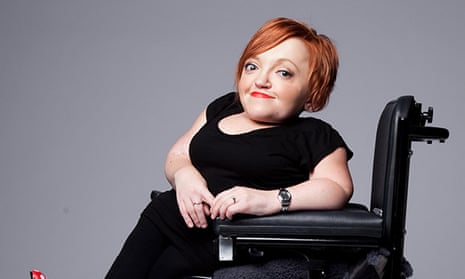Prominent figures from the disability sector have responded angrily to a campaign launched by the ideas festival TEDxSydney, which is being promoted using the name of renowned disability activist and journalist, Stella Young, who died last year.
The Stella’s Challenge campaign was launched on Thursday at Sydney Opera House under Young’s name. She once told a TEDxSydney audience: “Disability doesn’t make you exceptional, but questioning what you think you know about it does.”
Young had called-out those who used people with disability as what she described as “inspiration porn”, and detested quaint phrases such as “the only disability in life is a bad attitude”.
“No amount of smiling at a flight of stairs has ever made it turn into a ramp,” she was known for saying.
But critics say the campaign’s imploring of members of the public to ask people with a disability probing questions about their lives as being the kind of condescending approach Young would have deplored.
A petition launched in protest to Stella’s Challenge says by asking people to speak to, or on behalf of, those with a disability, the campaign ignored the fact people with a disability could speak for themselves.
“The first question recommended by TEDxSydney to ask someone with a disability is; ‘Would you mind if we talked about your disability first, so that I can understand how best to refer to it, and would you mind if we explored how it has impacted your life’,” the petition says.
“Thus defining that person by their disability, as opposed to ... their career or their interests or their intelligence or ... however they would want to be defined.”
People also took to social media using the #StellasChallenge hashtag to voice their concern.
The intent may be good, but the execution is flawed. Please don't ask me a question for #StellasChallenge
— Denise DiNoto (@mwny01) May 21, 2015
The president of People with Disability Australia, Craig Wallace, who worked closely with Young on the now de-funded ABC website Ramp Up, said it appeared to him no-one from the disability sector, including himself, had been consulted about the campaign.
“We’re really quite concerned about it, suggesting people go up and randomly ask people about their disability was not the thing Stella would have wanted, in fact she had a lot to say about probing questions,” Wallace said.
“She didn’t want them to be seen as an inspiration to other people, rather, disability should be seen as another part of human diversity, just like being Indigenous or gay or lesbian is a valid identity within our community.”
Stella would NOT have supported encouraging randoms to go up to people in the street and ask them patronising questions #StellasChallenge
— Craig Wallace (@CraigWtweets) May 21, 2015
While work was needed on community attitudes, it must be done in a way that was co-designed with people with disabilities, Wallace said.
“I think Stella would have wanted to challenge the community to to step up and start being more inclusive towards people with a disability and in a way that doesn’t see having a disability as being a deficit or an impact,” he said.
Bring back #RampUP if you want to fund a conversation on disability. Nothing about us, without us. #StellasChallenge
— Gaele (@gaelesobott) May 22, 2015
Young’s unexpected death in December prompted a moving ceremony to be held in her honour in her home state of Victoria, at Melbourne’s Town Hall, with hundreds of people attending to celebrate her.
A spokeswoman for TEDxSydney said Young’s family had been consulted when ideas for how the campaign should work was being researched.
Young’s thoughts about disability had been considered, she said. “We took Stella’s 2014 TEDxSydney talk as the starting point for this campaign,” she said. “In her talk she focusses on social attitudes, inclusion and accessibility, so we followed that lead.”
TEDxSydney had contacted Wallace since the backlash and hoped to work with him and his organisation on the campaign, she said, adding that more than 40 organisations in the disability sector and individuals with a lived experience of disability had been consulted in the lead-up to the Stella’s Challenge launch.
“Stella’s Challenge has been misunderstood by some - of course we never were suggesting people go out and start random conversations with people with disabilities,” she said.
“We are suggesting that conversations be self-organised by people across the community, people both with and without disabilities, to encourage communication and the sharing of ideas around social inclusion and accessibility.
“These conversations will become the foundation for our campaign, which, while being launched yesterday, is still being developed in ongoing collaboration and consultation with an ever-growing number of people and organisations in the disability sector.”
Guardian Australia is a media partner of TEDxSydney.

Comments (…)
Sign in or create your Guardian account to join the discussion